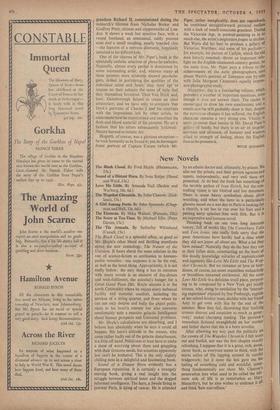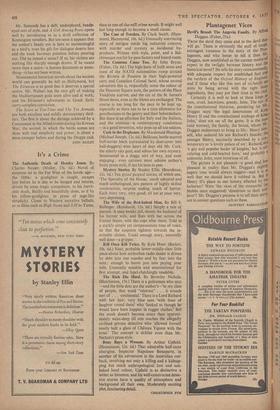New Novels
The Tin Armada. By Satherley Whitehand (Cassell, 15s.) The Black Cloud is a splendid affair, as good as Mr. Hoyle's other bland and thrilling manifesto
about the new cosmology, The Nature of the Universe. It bears about the same relation to the rest of science-fiction as ,antibiotics to homoeo-,
pathic remedies : one supposes it to be the real, as well as the latest thing. Appropriately, it is not really fiction : the only thing it has in common
with many novels is an ,element of day-dream and wish-fulfilment, the scientist's hunger for a
Great Good Place (Mr. Hoyle situates it in the north Cotswolds) where he enjoys every technical facility and material comfort, including the services of a string quartet, and from where he can not only despise and bully the abject politi- cians to his heart's content but also converse comfortably with a massive galactic Intelligence about human prospects and Universal problems. Mr. Hoyle's calculations are absorbing, and I believe him absolutely when he says it could all happen. His hero's attitude to the masses, who come rather badly out of the galactic disturbances, is a little off-hand. Politicians at least have to make a show of worrying about them and grappling with their tiresome needs, but scientists apparently just can't be bothered.. This is the only slightly chilling note in a delightful and fascinating book.
Sound of a Distant Horn evidently has a European reputation. It is certainly a strangely moving book, giving a real insight into the struggle between spiritual tenor and the dogged informed intelligence. The hero, a Swede living in postwar Paris, is dying of cancer. He is attended
by an atheist doctor and, ultimately, by priests. We also see the priests, and their private agonies, and upsets, independently, and very well these are presented. At its best the book has something .0f the terrible pathos of Ivan Ilyitch, but the ,con- trolling vision is too blurred and too uncertain. There is some heavy symbolism about all-in wrestling, and when the hero in a 'particularly gloomy mood on a.wet day in Paris is looking for a church, a rat has to run over his -foot and a passing lorry splashes 'him 'with filth. But it is an impressive and humane novel.
Thinking back on our own long innocent history, full of works like The Canterbury Tales and Toni Jones, one really feels sorry that the poor Americans have hardly had a time when they did.not_know all about sex. What a lot theY have missed! Naturally they do The best they can in their fallen state, constructing on the basis of this deadly knowledge miracles of sophistication and ingenuity like Love Me Little and The Wap-
shot Chronicle. 'But no romance or love or baw- diness, of course, no sweetreasonless melancholY
or breathless unnamed excitement. All the same
Love Me Little is a delicious small piece, purport- ing to be composed by a New 'York girl nearly sixteen, who, stung to emulation by the 'interest-
ing experience' enjoyed by Sue Fosburgh, captain of her school hockey team, decides with her friend Amy to get even with Sue by the end of the summer. How they fail, dicovering that 'nothing arouses distrust and suspicion as much as gener- osity,' makes charming reading. The narrator's immediate fictional stranglehold on her mother and father shows that she is a born novelist.
After elbowing my way past the publicity on the covers of The Wapshot Chronicle I felt worn out and fretful, nor was the first chapter exactlY refreshing. I suppose that it is a great, rich, dense, clever book, as everyone seems to think, with the
warm saliva of life lapping around its careful bridgework; but it none the less gave me the feeling of somethinecold and watchful, some- thing fundamentally not there. Mr. Cheever's penetration into what used to be called the inti- mate side of life is as remorseless as Mary Macarthy's, but he also wishes to embrace it all and think 'how marvellous.' Mr. Symonds has a deft, underplayed, beady- eyed sort of style, and A Girl Among Poets opens well by introducing us to a droll collection of Kensington versifiers. But too soon it appears that the author's beady eye is here as unmeaningful as a bird's; even his gift for dialogue deserts him and the book becomes pointless before petering out. Did he intend a satire? If so, his victims are nothing like sharply enough drawn. If he meant more than a satire—a human document or some- thing—it has not been written.
Monumental historical novels about the ancient world can generally be left to Hollywood, but The Etruscan is so good that it deserves a special notice. Mr. Waltari has the rare gift of making the Mediterranean gods seem alive and at work; and his Etruscan's adventures in Greek Sicily carry complete conviction.
The Score at Tea-Time and The Tin Armada are both excellent and mildly documentary thril- lers. The first is about the damage achieved by a Communist in the Allied armies during the Korean War; the second, in which the battle scenes are done with real simplicity and power, is about a mine-sweeper before and during the Dieppe raid.
JOHN BAYLEY























































 Previous page
Previous page